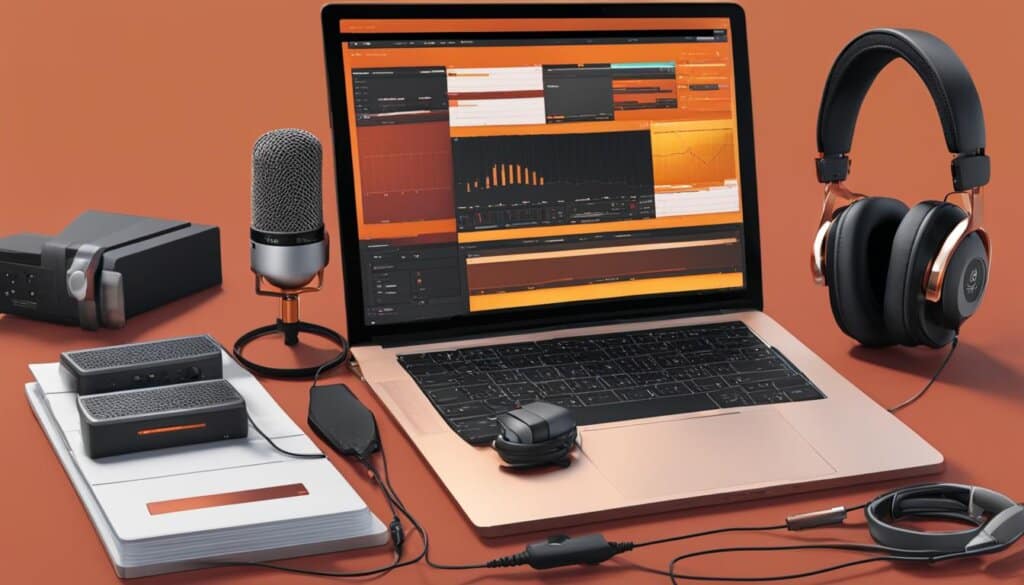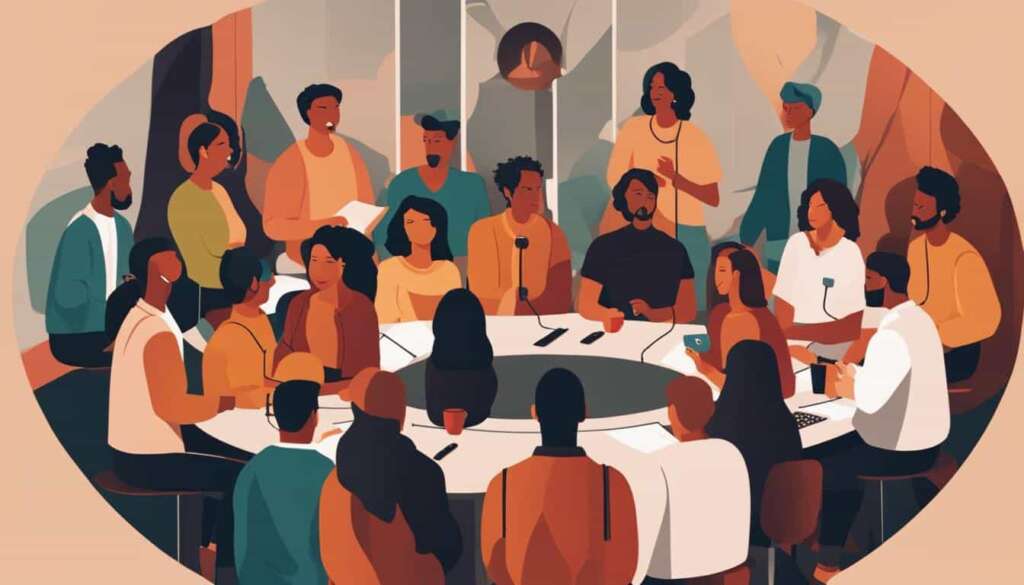Table of Contents
A podcast is an audio programme that can be subscribed to and listened to on a smartphone. It consists of spoken word, audio episodes centered around a specific topic or theme. Podcasts can be original content, covering a wide range of topics and formats. The term “podcasting” was first used in 2004, but the medium itself has been around since 2000. Podcasts are primarily audio-only, although video podcasts do exist. They are often listened to in the background while doing other activities, like driving or exercising.
Nowadays, podcasts have become a popular form of entertainment and information-sharing. From true crime stories to educational discussions, there is a podcast for every interest. But what exactly is a podcast and how does it work? This article aims to provide you with a comprehensive overview of podcasts, their origins, and their impact on the media landscape.
How Do Podcasts Work?
Podcasts have become increasingly popular in recent years, offering a convenient and engaging way to consume audio content. If you’re new to podcasts and wondering how they work, this section will guide you through the process.
First, to listen to podcasts, you’ll need a podcast app on your smartphone. There are several podcast apps available, each with its own unique features and interface. Some popular podcast apps include Apple Podcasts, Spotify, and Google Podcasts. You can download these apps from your device’s app store.
Once you have a podcast app installed, you can search for specific podcasts or browse through various categories to discover new shows. When you find a podcast you’re interested in, you can subscribe to it. Subscribing to a podcast ensures that you receive new episodes automatically.
Curious how to subscribe to a podcast? Here’s how:
- Open your chosen podcast app and navigate to the search or discover section.
- Enter the name of the podcast or keywords related to the topic you’re interested in.
- Browse through the search results and select the podcast you want to subscribe to.
- Once you’re on the podcast’s page, look for the “Subscribe” or “Follow” button and click on it.
After subscribing to a podcast, new episodes will be automatically downloaded or streamed to your device. You can listen to podcasts using headphones, speakers, or even smart speakers like the Amazon Echo. This provides flexibility in terms of where and how you enjoy your favorite shows.
Podcasts cover a wide range of topics and come in various formats, such as interviews, storytelling, educational content, and more. Whether you’re interested in true crime, business, sports, or self-improvement, there’s a podcast out there for you.
Listening to podcasts is a great way to make the most of your time, whether you’re commuting, exercising, or relaxing at home. It allows you to stay informed, entertained, and inspired while multitasking.
Not sure which podcast to listen to? Here are some recommendations:
“The Joe Rogan Experience” – A popular podcast featuring in-depth conversations with a wide range of guests from different fields.
“Serial” – This podcast tells gripping and immersive true crime stories over multiple episodes.
“The Daily” – A news podcast from The New York Times that provides in-depth analysis of current events.
Now that you know how to listen to podcasts and have some recommendations, it’s time to dive into the world of audio storytelling and explore the vast array of podcasts available to you.
Podcast Listening Apps
Here are some popular podcast apps:
| Podcast App | Platform |
|---|---|
| Apple Podcasts | iOS |
| Spotify | iOS, Android |
| Google Podcasts | Android |
| Overcast | iOS |
| Castbox | iOS, Android |
Key Benefits of Podcasts
- Flexibility: Podcasts can be listened to anytime, anywhere, allowing you to fit them into your schedule.
- Education and Entertainment: Podcasts cover a wide range of topics, providing valuable information and engaging storytelling.
- Personal Growth: Listening to podcasts can inspire and motivate you to learn new things and explore different perspectives.
- Accessibility: Podcasts are accessible to anyone with a smartphone and an internet connection.
- Free and Paid Options: Many podcasts are available for free, while some offer premium content or ad-free listening options.
Whether you’re a podcast enthusiast or just starting your podcasting journey, exploring different podcasts and discovering new favorites is an exciting way to expand your knowledge and stay entertained.
The Rise and Evolution of Podcasting
The history of podcasting traces back to the early 2000s when it emerged as a niche medium for independent creators. Over time, it has experienced significant growth and gained recognition from mainstream media organizations such as The New York Times and NPR. Today, podcasts have become a powerful platform for delivering audio content, offering a unique listening experience to a global audience.
The podcast industry has seen remarkable expansion, with a vast number of podcasts and episodes available to listeners. As of December 2022, there are over 2 million podcasts and a staggering 152 million episodes. This growth highlights the increasing popularity and demand for podcasting as a form of entertainment, information, and storytelling.
“Podcasting has disrupted traditional media models, providing a platform for independent voices and enabling content creators to reach a diverse audience.”
The rise of podcasting has had a profound impact on the media landscape. It offers a diverse range of voices and perspectives that may not have been represented in mainstream media. Independent creators have found a platform to share their stories, expertise, and passions, connecting with a global audience. Listeners, on the other hand, have access to an ever-expanding library of content, exploring a wide array of topics and genres.
While the podcast industry has enjoyed steady growth, there is still room for further expansion and innovation. Podcasting continues to evolve, presenting opportunities for new formats, monetization models, and technological advancements. As more listeners embrace podcasts as a preferred form of media consumption, the industry will likely witness exciting developments and transformative experiences.
The Growth of Podcasting: A Visual Representation
| Year | Number of Podcasts | Number of Episodes |
|---|---|---|
| 2010 | 10,000 | 50,000 |
| 2015 | 100,000 | 500,000 |
| 2020 | 1,000,000 | 10,000,000 |
| 2022 | 2,000,000 | 152,000,000 |
The table above illustrates the exponential growth of podcasts and episodes over the years, showcasing the remarkable expansion and impact of the podcast industry.
Creating and Hosting a Podcast
To create a podcast, you’ll need a few essential components and follow a straightforward process. Let’s explore the steps involved in creating and hosting your own podcast:
Step 1: Equipment and Software
First, gather the necessary podcast equipment. The three key items you’ll need are:
| Podcast Equipment | Options |
|---|---|
| Microphone | Choose a quality microphone to ensure clear audio recordings. Popular options include the Rode NT-USB and Audio-Technica ATR2100x. |
| Recording Software | Utilize software like Audacity (a free option) or professional alternatives like Adobe Audition and Logic Pro X for recording and editing your podcast episodes. |
| Headphones | Invest in a good pair of headphones for monitoring audio quality during recordings. Consider options like the popular Sennheiser HD 280 Pro or Beyerdynamic DT 770 Pro. |
Step 2: Podcast Hosting Platform
Next, select a reliable podcast hosting platform to store your podcast episodes and generate the RSS feed necessary for distribution. Some popular hosting platforms include:
- Podbean: Offers user-friendly features and podcast monetization options.
- Buzzsprout: Provides detailed analytics and a simple interface for beginners.
- Libsyn: Known for its robust hosting and distribution capabilities.
Step 3: Recording and Editing
Now that you have your equipment and hosting platform ready, it’s time to start recording and editing your podcast episodes. Here are some techniques to consider:
“Scripted Content: Prepare a script or outline for structured episodes with focused topics.”
“Spontaneous Discussions: Engage in casual conversations with co-hosts or guests to create an authentic and lively atmosphere.”
Step 4: Uploading and Distribution
Once your episodes are recorded and edited, upload them to your podcast hosting platform. The platform will generate an RSS feed for your podcast, which allows listeners to find and subscribe to it. You can further expand your podcast’s reach by listing it on popular directories like Apple Podcasts and Spotify. This way, potential listeners can easily discover and enjoy your content.
With these steps in mind, you’re ready to embark on your podcasting journey and share your unique voice with the world.

Benefits and Impact of Podcasting
Podcasting offers several benefits for both content creators and listeners. It is relatively easy and inexpensive to create a podcast, requiring minimal equipment and technical expertise. This accessibility has contributed to the tremendous growth of the podcasting industry in recent years.
For content creators, podcasts provide a versatile platform to share their knowledge, stories, and ideas with a global audience. Whether it’s a solo show or a collaborative effort, podcasts allow individuals and organizations to showcase their expertise and build a loyal following. The intimate nature of podcasting creates a unique connection with the audience, fostering trust and authenticity.
Engaging with the Audience
One of the key benefits for listeners is the ability to access a wide range of topics on-demand. Podcasts cover diverse subjects, including news, entertainment, education, and personal development. With podcasting, listeners have the freedom to choose the content that resonates with their interests and consume it at their convenience.
Podcasts also offer a valuable multitasking opportunity, allowing listeners to engage with content while going about their daily routines. Whether it’s during a commute, workout, or household chores, podcasts provide entertainment and education without requiring undivided attention.
Marketing and Brand Building
Beyond its entertainment value, podcasting has emerged as a powerful marketing tool for businesses. Podcasts offer a unique avenue to showcase expertise and establish thought leadership. Brands can leverage podcasts to reach niche audiences, demonstrating their industry knowledge and building trust with potential customers.
“Podcasting allows us to engage with our target audience on a deeper level. It’s not just about advertising; it’s about building a relationship and fostering brand loyalty.” – Laura Johnson, Marketing Manager at Smith & Co.
Additionally, podcast audiences are highly engaged and loyal. Listeners develop a connection with hosts and their content, resulting in a strong bond between the podcast and its audience. This affiliation creates opportunities for businesses to cultivate brand advocates and long-term customer relationships.
The Rising Popularity of Podcasts
The impact of podcasting is evident in its soaring popularity. Millions of people worldwide now regularly listen to podcasts, leading to an increased demand for quality content. The podcasting industry has shown remarkable growth and resilience, attracting both independent creators and mainstream media organizations.
Notable Podcasts and Future Outlook
When it comes to popular podcasts, there is an abundance of captivating content available across a wide range of genres and topics. One notable podcast is “Serial,” which has gained acclaim for its gripping long-form narratives that keep listeners on the edge of their seats. Another popular podcast is “The Daily,” a news and analysis show from The New York Times that provides a daily deep dive into current events. Furthermore, “The Joe Rogan Experience” stands out with its in-depth conversations with a variety of guests, covering thought-provoking and diverse subjects.
The future of podcasting is brimming with promise, as the industry continues to experience rapid growth. With advancements in technology, the possibilities for podcast production are expanding, leading to more immersive and interactive experiences for listeners. Moreover, the podcast sector is witnessing a steady increase in audience numbers, highlighting its enduring appeal and impact. As the medium evolves, we can expect the emergence of even more diverse and innovative podcasts that cater to the wide range of listener preferences and interests.
With such a diverse array of popular podcasts and a bright future ahead, podcasting has become a significant part of modern media consumption. As listeners continue to seek out engaging and informative audio content, the podcasting industry will undoubtedly thrive, providing compelling shows for every taste and interest.
FAQ
What is a podcast?
A podcast is an audio programme that can be subscribed to and listened to on a smartphone. It consists of spoken word, audio episodes centered around a specific topic or theme.
When was the term “podcasting” first used?
The term “podcasting” was first used in 2004, but the medium itself has been around since 2000.
How do podcasts work?
Podcasts work by using a podcast app on a smartphone to subscribe to a specific podcast series. Once subscribed, new episodes are automatically delivered to the app, allowing listeners to download and listen to them at their convenience.
What are some popular podcast apps?
Popular podcast apps include Apple Podcasts, Spotify, and Google Podcasts.
How can I listen to podcasts?
Listening to podcasts can be done through headphones, speakers, or even smart speakers like Amazon Echo.
How has podcasting evolved over time?
Podcasting has grown in popularity since its inception in the early 2000s. It started as a niche medium for independent creators but has since been adopted by mainstream media organizations like The New York Times and NPR.
How do I create a podcast?
Creating a podcast requires a few essential components, including a microphone for recording audio, recording software or applications like Audacity, and a podcast hosting platform like Podbean or Buzzsprout.
What are the benefits of podcasting?
Podcasting offers several benefits for both content creators and listeners. It is relatively easy and inexpensive to create a podcast, requiring minimal equipment and technical expertise. Podcasts provide a platform for individuals and organizations to share their knowledge, stories, and ideas with a global audience.
What are some notable podcasts?
Some popular podcasts include “Serial,” “The Daily,” and “The Joe Rogan Experience.”
What is the future outlook for podcasting?
The future of podcasting looks promising, with increased podcast production, continued growth in audience numbers, and advancements in technology allowing for more immersive and interactive podcast experiences.













